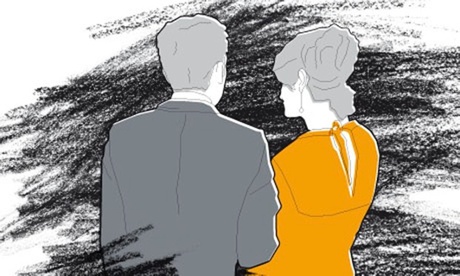
At the library, a woman puts her elbows on the information desk, cradles her face in her hands and starts wailing. A member of staff tells her, in a calm and teacherly fashion, that the internet will probably be back on shortly, but there is nothing he can do right now.
“You have to help me. I’m in the middle of a game,” the woman cries, as distressed as if she were in physical pain. She has mental health issues, but she’s probably doing what most of us trying to get online would do if we cared little about what others thought of us. Although the loss of internet connection does not mark the apocalypse, it reminds us that sometimes we are powerless over situations that have the capacity to make us feel angry, upset or plain old miserable. There is really nothing that any of us can do for this woman, save getting up and tinkering with the library’s modem ourselves.
I am embarrassed by her crying, and after looking at her I look away. I feel redundant: nobody can ignore what is happening because the woman is metres away. Her caterwauling has broken the stiff silence of the room, and continues thus, reminding us that she won’t just politely disappear.
A couple of minutes later, the member of staff says triumphantly, “internet’s back on!” and the woman stops crying with the immediacy of a voice-mute button having being pressed.
The next day I am inspired to cry like that woman. I am in the car, having dropped my sister at the airport. Seconds after saying goodbye, I miss her, but our long separations are never as bad in theory as the forecast of us being apart. With my head resting on the steering wheel, I sob as loudly and as unapologetically as the woman in the library, despite being told to drive on by a neon-jacketed airport official.
My sister is long out of sight, but not yet in the air. I find this in-between time unsettling and fantasise, like a child, that she might turn around and come back to us.
“It’s good to cry,” I tell my children. But only the youngest do it with ease. My daughter and I cry in solitude, and blotchy red skin and puffy eyes will be the only signs. I’ve seen R cry a couple of times, most memorably at our wedding. It was drunken, sentimental sobbing that prevented him from finishing his groom’s speech, but I think he was happy. I’ve seen my father cry only once, when he returned from the field where his beloved horse had just been put down. As he walked into the house he wiped away his tears as if they were offensive.
I was never told not to cry. And yet, away from occasions where it is acceptable, expected almost (therapy, children’s nativity plays), I find it incredibly difficult. Presently, I see that my daughter could do with a big old cry so much of the time, but I’m sure she looks at me and thinks, “You hide when you cry, so why shouldn’t I?”
When I return home from the airport in the half-light, the street lamps are barely warm; it is too early for sleep and yet my daughter’s bedroom curtains are closed.
I knock on her door and find her lying in bed. She says she doesn’t feel well, and I put my palm on her forehead to check for a fever. But she feels fine. Then I see the black streaks of mascara on her cheek. “You were happy when I left for the airport,” I think. But then I realise that my sister is also my daughter’s aunt, and they are very close.
“I really miss her, and this time I didn’t even get to say a proper goodbye because you were in such a rush,” she says.
I want to empathise with my daughter and tell her about earlier, and how my crying lasted all the way on to the M4, until a Bee Gees song came on the radio and made me laugh because I remembered how my sister once had a thing for John Travolta in Saturday Night Fever. I am almost too ashamed to admit that missing my sister makes me feel really sad. If I admit that, I’m scared I’ll cry.
I want to say that I cried a lot, but I can’t: the confession sits in my throat. And then we both hear the low diesel purr of a black cab, and for a split second I believe that my daughter, like me, thinks that maybe, just maybe, my sister has returned.

